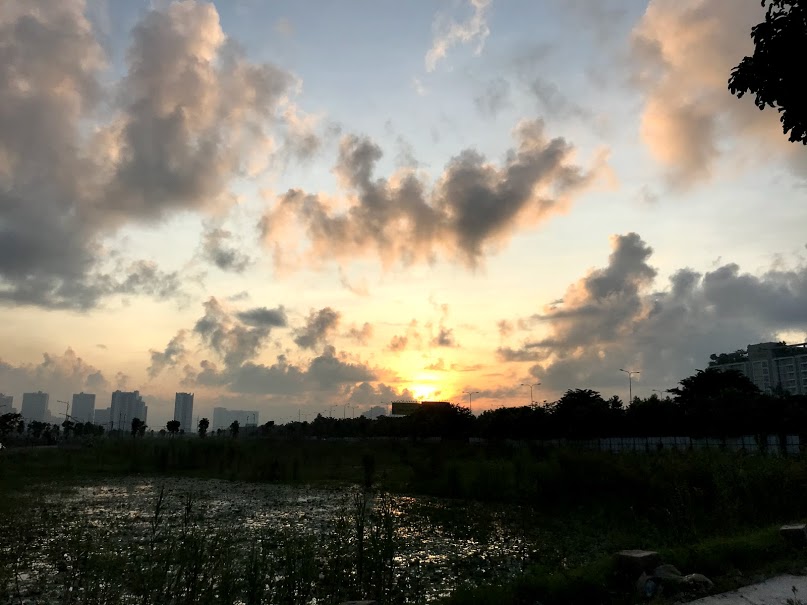
When I applied for our Australian residencies over five years ago, at one stage of the process I had to log every trip made over the previous ten years (for my daughters also). Quite the task, it turned out, given the privileged nature of how I have spent my time living overseas.
In spite of all the hours I’ve notched up sat in musty metal tubes, soaring over countries and continents before being spat out the other end, I’m always be-dazzled by the experience.
Inhaling Saigon’s humid fumes on a Tuesday evening one minute, buzzing through a throng of scooter traffic enroute to Tan Son Nhat airport, you are just two to three plastic trays of food (washed down with gulps of industrial strength gin and tonic) away from squinting down at the London Eye the following morning, the white glare off the city’s skyscrapers winking back at you.
Home from home.
Last month, I flew back to England briefly, a short touchdown in Doha between Saigon and London Gatwick, before I trundled off through customs and boarded a train to Brighton. Half an hour later and I’m walking out of the station and onto Western Avenue, down a small laneway and onto the pebbled beach, bacon sandwich and coffee in hand.
The sea was murky, and the waves were heavy, but the feeling of salt water on the skin and the cold clumpy sand between my toes was spectacular. Like it was worth travelling over twenty hours just for that.
Staring across to the end of Brighton’s famous pier, I spotted the Helter Skelter ride, calmly battered over the years by gales and the slow erosion of the ratan mats that slip-slide around it, before flopping onto the cushioned base.
Florence and Martha have swooshed down that Helter Skelter, in the summer of 2018, and in their pre-teens. They did so with the son of one of my oldest friends, Quinten, aka “Q”. We met at the beginning of secondary school in 1986. Alphabetically organised, our single wooden-top desks were set out in lines: Ahn, Ali, Babcock, Baura, Bishop and Bullock – we were the first row from the classroom door.
Back then, Q (Babcock) had a shock of blond hair and ruby red lips. I use that last description poignantly because, only last night, Q and his family were sat here in our apartment in Saigon, and his children were joking about how red his lips still are. One of the school dinner ladies, Q recalls, once asked him very loudly if he was “wearing lipstick” as she dolloped a ladle of mashed potato onto his plate. The accusation has made it into family folklore ever since.
In any case, Q and Alex and their kids are, as these words are being typed out, about six hours into their flight back to London. They safely completed a two-week romp around the south of Vietnam, book-ending the visit in Saigon, and indulging with us in some of our favorite past-times – eating, drinking and playing games.
The added bonus for me, these past couple of weeks, was to see how smoothly all our kids connected with each other.
Akin to when Flo and Martha meet up with their UK or their Australian cousins, they simply dive in and have fun. Second-hand clothes markets were frequented (thanks to Issy), cocktails and mocktails at our local Japanese bar were sampled, Vietnamese spring rolls were ordered, and re-ordered, nails were painted, balls were thrown in the pool. It was all so very easy. New surrounds for them, new visitors for us to show around. A win-win.
As we turn our sights to a transition to Melbourne in 2024, it’s times like those we’ve just had with special friends that makes long-distance relationships bind even deeper. You find yourself taking off from where you last left things, as if the time in between has evaporated. There is a clarity of purpose, a steady flow of stories and sharing. Even the simple past-time of playing a game of cards is attributed an extra sprinkle of pleasure.
These moments are treasured, and these lifelong connections are everything.
Thank you Babcocks!








![IMG_9870[1]](https://saigonsays.com/wp-content/uploads/2016/05/img_98701.jpg)